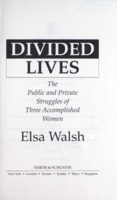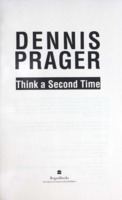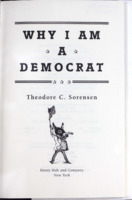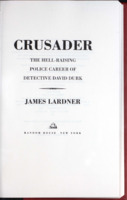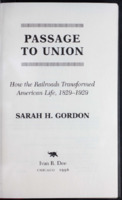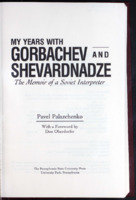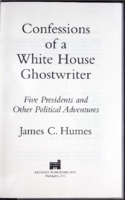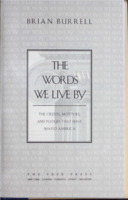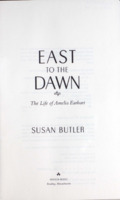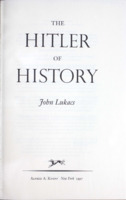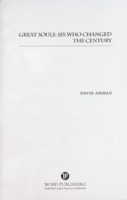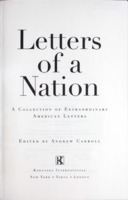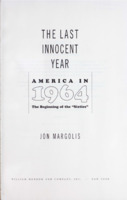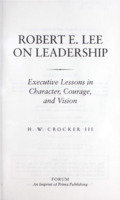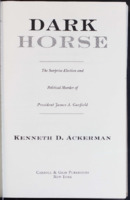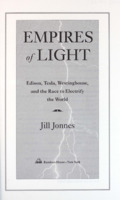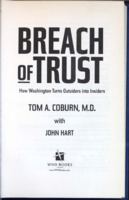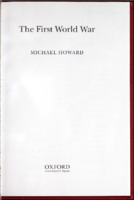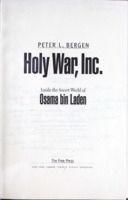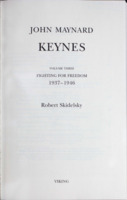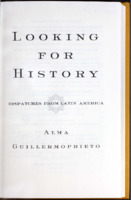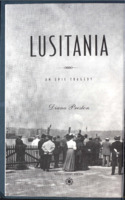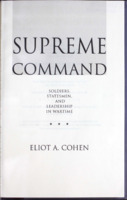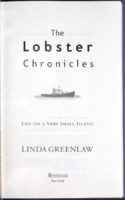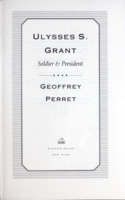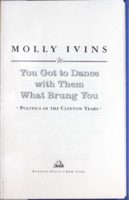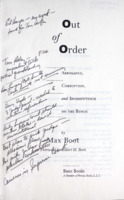Search
728 items
-
Divided lives: the public and private struggles of three accomplished women.
An intimate look at the lives of three contemporary women--television journalist Meredith Vieira, conductor Rachael Worby, and breast surgeon Dr. Alison Estabrook--portrays their conflicts as they struggle to balance their own needs with the needs of those around them. -
Think a second time.
Journalist Dennis Prager's collection of 43 essays drawn from his quarterly journal entitled Ultimate Issues. -
Why I am a democrat .
For those Americans who have questioned or forgotten the aims and strengths of the Democratic Party, a well-known Democrat from the Kennedy era has written a thoughtful reminder. Ted Sorensen was the principal counsel, policy adviser, and speechwriter for President Kennedy and has experienced more than four decades of political activity. Here he articulates the fundamental reasons and principles behind proclaiming oneself a Democrat. In Why I Am a Democrat, Sorensen defines himself in terms of the major themes on which Democrats and Republicans divide - their differing approaches to government and the free market, to national and individual distress and discrimination, to privacy and public service. Outlining his own vision and ruminating about the roots of that vision, he provides a skeleton key for the Democratic impulse.Neither defense nor apologia, but rather an explanation of basic Democratic thought regarding public-policy issues - as well as personal memoir of belief in a set of values - Why I Am a Democrat provides hope, reason, and intellectual ammunition for despairing Democrats now wandering the political wilderness. -
Crusader: the hell-raising police career of Detective David Durk.
James Lardner's biographical work on David Durk -
Passage to Union: how the railroads transformed American life, 1829-1929.
In Passage to Union, Sarah Gordon has written a richly informed narrative history of the growth of the railroads, an American icon. But her conclusions are surprising. Where the railroads and their entrepreneurs are ordinarily celebrated for their accomplishments, Ms. Gordon finds that the cost of their achievements was high. Conflicts of interest - at local, state, and regional levels - characterized railroad growth at every stage. Despite the stated aims of government.and the railroad corporations to promote settlement and commerce, Ms. Gordon shows that the states lost control of these enterprises and lost the economic benefits of their traffic. Smaller towns withered as people and money flowed to larger cities. By 1900 the union that had emerged reflected the worst fears of railroad critics. The South and West had been settled, but wealth had flowed so heavily to the cities that rural life had lost its attraction. Passage to Union.is compelling reading because Ms. Gordon has drawn from diaries, memoirs, literature, advertisements, newspapers and magazines, public records, and railroad history to construct her narrative. The impact of the railroads on people and their communities is powerfully illustrated in this absorbing story of apparent triumph and real loss. -
My years with Gorbachev and Shevardnadze: the memoir of a Soviet interpreter.
As the principal English interpreter for Mikhail Gorbachev and his foreign minister, Eduard Shevardnadze, in the critical period of 1985-1991, Pavel Palazchenko participated in all U.S.-Soviet summit talks leading to the end of the Cold War. This personal and political memoir sheds new light on Soviet-American relations and personalities during that time.Palazchenko focuses on what he saw with his own eyes during important negotiating sessions with world leaders such as Presidents Ronald Reagan and George Bush, Secretaries of State George Shultz and James Baker, and Prime Minister Margaret Thatcher. He shares his impressions and opinions about these leaders as well as their Soviet counterparts and gives a firsthand account of the phase of preparation leading up to important international events, including the process of hammering out positions on sensitive arms control issues. Palazchenko describes the events themselves, such as the summits in Reykjavik, Malta, and Moscow, adding many fascinating details to previous accounts. -
Confessions of a White House ghostwriter: five presidents and other political adventures.
White House speechwriter James C. Humes put words into the mouths of five presidents - Eisenhower, Nixon, Ford, Reagan, and Bush. In the process, he got to know these prominent leaders as few ordinary staffers could, while observing the inner workings of the White House. Now, in this frank and witty memoir, Humes reveals how vital political decisions and great political speeches were made. And he underlines the importance of character in a politician - something no.speechwriter can hide. Humes shares what he learned in his 25-year career as a presidential speechwriter. Page after page crackles with such fascinating disclosures as Nixon's suspicions about the identity of "Deep Throat", the real reason behind Ford's pardon of Nixon, why Reagan was his own best speechwriter, and why Bush lost. Humes reveals the secrets of the speechwriting trade, and spins marvelous anecdotes including sending Eisenhower to the Ladies' Room, writing.the plaque that was planted on the moon by Neil Armstrong and Edwin Aldrin, dancing with the Queen of England, and discussing nuclear disarmament over dinner with Churchill and Eisenhower. -
The words we live by: the creeds, mottoes, and pledges that have shaped America.
Brian Burrell's splendid collection shows that many of the phrases we once lived by can still have resonance today. A comprehensive, fascinating treasure trove of American common sense and whimsy, The Words We Live By presents a sentimental rediscovery of a lost era in American history.Burrell's work was inspired by his father, an obsessive collector of words and a chronic nostalgia buff who traveled widely with his family, introducing them to the landmarks, monuments, and other symbols of America's past. Throughout his life, he clipped or wrote down memorable phrases, quotes, mottoes, and quips, both the silly and the profound, the playful and the maudlin. Burrell has lovingly compiled his father's collection of scrapbooks, complementing them with extraordinary research into the origins of America's civic ethics, to produce a truly memorable and inspirational work of historical reference. More than just a compendium of classic American wit and wisdom, The Words We Live By brings this material to life with poignantly told stories, forgotten anecdotes, and deeply considered meditations on the meaning of the words that have shaped the American nation. -
East to the dawn: the life of Amelia Earhart.
Susan Butler's biographical work on aviator Amelia Earhart. -
The Hitler of history.
Since 1945 there have been more than one hundred biographies of Hitler, and countless other books on him and the Third Reich. What happens when so many people reinterpret the life of a single individual? Dangerously, the cumulative portrait that begins to emerge can suggest the face of a mythic antihero whose crimes and errors blur behind an aura of power and conquest. By reversing the process, by making Hitler's biographers - rather than Hitler himself - the subject of inquiry, Lukacs reveals the contradictions that take us back to the true Hitler of history. Like an attorney, Lukacs puts the biographies on trial. He gives a masterly account of all the major works and of the personalities, methods, and careers of the biographers (one cannot separate the historian from his history, particularly in this arena); he looks at what is still not known (and probably never will be) about Hitler; he considers various crucial aspects of the real Hitler; and he shows how different biographers have either advanced our understanding or gone off track. -
Great souls: six who changed the century.
Personal character profiles of Billy Graham, Mother Teresa, Aleksandr Solzhenitsyn, Pope John Paul II, Elie Wiesel, Nelson Mandela. -
Letters of a nation : a collection of extraordinary American letters.
Collection of over two hundred letters on a variety of subjects by Americans from all walks of life, spanning more than 350 years of American culture and history. -
The last innocent year, America in 1964: the beginning of the "sixties".
Begins the day after the Kennedy assassination & leads up to Lyndon Johnson's defeat of Barry Goldwater a year later. A former political reporter for the "Chicago Tribune" remembers the year John Kennedy was killed, Lyndon Johnson began the Great Society, young men started burning their draft cards, blacks burned whole neighborhoods, women began wondering if they were being oppressed, Congress passed the Tonkin Gulf Resolution, and three civil rights workers were murdered in Mississippi. -
Another life: a memoir of other people.
The editor of Simon & Schuster recalls the greats of the publishing industry and famous writers, politicians, and actors he has encountered. -
Robert E. Lee on leadership: executive lessons in character, courage, and vision.
H.W. Crocker's work describing General Robert E; Lee's skills as a leader. -
Ghost light: a memoir.
Rich grew up in the small-townish Washington, D.C., of the 1950s and early '60s, a place where conformity seemed the key to happiness for a young boy who always felt different. When Rich was seven years old, his parents separated. Bouncing from school to school and increasingly lonely, Rich became terrified of the dark and the uncertainty of his future. But there was one thing in his life that made him sublimely happy; the Broadway theater. -- Jacket. -
Dark horse : the surprise election and political murder of President James A. Garfield.
In this book Kenneth Ackerman re-creates an American political landscape where fierce battles for power unfolded against a chivalrous code of honor in a country struggling to emerge from the long shadow of recent war. He casts familiar Civil War figures like Ulysses S. Grant and Winfield Scott Hancock in unfamiliar roles as politicos alongside feuding machine bosses like senators Roscoe Conkling and James G. Blaine and backroom string-puller Chester A. Arthur, Garfield's unlikely vice-presidential running mate. The journey through political backrooms, dazzling convention floors, and intrigue-filled congressional and White House chambers, reveals the era's decency and humanity as well as the sharp partisanship that exploded in the pistol shots of assassin Charles Guiteau, the weak-minded political camp follower and patronage seeker eager to replace the elected commander-in-chief with one of his own choosing. Garfield's path from a seat in the House of Representatives to the White House to martyred hero changed the tone of politics for generations to come. -
Empires of light : Edison, Tesla, Westinghouse, and the race to electrify the world.
A chronicle of scientific history recounts the race among inventor Thomas Edison, eccentric genius Nikola Tesla and George Westinghouse, a tough entrepreneur and powerful empire builder, to bring electricity to the world. -
Breach of trust: how Washington turns outsiders into insiders.
Breach of Trust takes you directly into Coburn's closed-door coversations with policymakers and sheds new light on the rampant misuse of government funds, pork barrel shenanigans, shameless attempts to "buy" votes, and the unbelievable ways the system often turns politicians against their own constituents perpetrating an inexcusable breach of trust on the American public. -
The First World War.
The European powers were ready for war in 1914. Germany, fueled by 'archaic militarism, global ambitions, and neurotic insecurity', took the offensive, in the misguided belief that it would shorten the conflict. Four years later, eight million people had died in the most apocalyptic episode the world had known. "Sir Michael Howard has meditated on the subject of the First World War for several decades. The result is an account of the events leading up to, and culminating in that conflict. With tremendous precision and clarity of vision he describes the effects of the conflict on soldiers and civilians alike, examining the military manoeuvres of the Allies and the rival alliances: the inhumane deployment of poison gas on the battlefield, the accelerated development of mechanized warfare, the establishment of the Royal Air Force in Britain, and the war at sea, which would draw America into the conflict. He highlights how the war fought at home - against the shortages of food, fuel, and raw materials for industry - caused the irreversible decline in German morale, a demise which was to lead to the eventual surrender of the German state." "Humiliated and bankrupt, utterly disempowered, Germany would never lose the belief that the war had been imposed upon her by the Allies. It would be that sense of injustice that would resonate through the decades to follow - to find final, chilling retribution in the hands of the Third Reich."--Book Jacket. -
Book business : publishing past, present, and future.
Jason Epstein has led arguably the most creative career in book publishing during the past half-century. In 1952, while a young editor at Doubleday, he created Anchor Books, which launched the so-called quality paperback revolution and established the trade paperback format. In the following decade he became cofounder of The New York Review of Books. In the 1980s he created the Library of America, the prestigious publisher of American classics, and The Reader's Catalog, the precursor of online bookselling.."In this short book he discusses the severe crisis facing the book business today - a crisis that affects writers and readers as well as publishers - and looks ahead to the radically transformed industry that will revolutionize the idea of the book as profoundly as the introduction of movable type did five centuries ago."--BOOK JACKET. -
Holy war, Inc. : inside the secret world of Osama bin Laden.
Author Peter Bergen's work on the nature of radical Islamist jihad networks. -
John Maynard Keynes.
The first two volumes of Robert Skidelsky's definitive and consummate biography of John Maynard Keynes were hailed as publishing events on both sides of the Atlantic. Already published to acclaim in Britain, this third and final volume covers Keynes's later years from 1937 to his death in 1946. During this period, Keynes's outstanding contribution to the financing of Britain's war effort, to the building of the postwar economic order, and his role in Britain's struggle to preserve its independence within the Atlantic alliance solidified the economist's lasting importance in twentieth-century history. -
Looking for history: dispatches from Latin America.
Since Alma Guillermoprieto became The New Yorker's Latin American correspondent a decade ago, she has emerged as the most informed and admired writer on her part of the world. In these superb pieces of reportage and analysis she anatomizes a region we are intimately linked with yet sadly ignorant of. She writes in depth about three countries that are in deep difficulty. "Cuba, to which she returned after many years - a place in an exhausting holding pattern, waiting for Castro's departure yet anxious about what may replace him. Colombia, in which she has spent several years and which is fatally splintered among the government, the left-wing guerrillas who control large sections of the country, thanks in part to money from the drug trade, and the right-wing paramilitaries. Mexico, where she lives, which has been beset by the uprising in Chiapas (where she encounters the legendary masked leader, Marcos) and by the corruption of the government, yet is emerging for the first time into some kind of real democracy." "Finally, she gives us the stories of Eva Peron - and so of Argentina; Che Guevara - and so of the aborted Marxist revolution in Latin America; and Mario Vargas Llosa, the great Peruvian novelist who in 1990 lost the battle of the presidency to Alberto Fujimori." "Looking for History is personal reportage that is infused with the author's unique understanding of a world that she is a part of, but that she can also stand apart from and sympathetically observe."--Jacket. -
Lusitania: an epic tragedy.
An account of the 1915 sinking of the Lusitania offers a portrait of early twentieth-century maritime history and the terrible impact of the disaster on the course of World War I. -
Supreme Command: Soldiers, Statesmen, and Leadership in Wartime.
The relationship between military leaders and political leaders has always been a complicated one, especially in times of war. When the chips are down, who should run the show--the politicians or the generals? In Supreme command, Eliot Cohen examines four great democratic war statesmen--Abraham Lincoln, Georges Clemenceau, Winston Churchill, and David Ben-Gurion--to reveal the surprising answer: the politicians. Lincoln, Clemenceau, Churchill, and Ben-Gurion led four very different kinds of democracy, under the most difficult circumstances imaginable. They came from four very different backgrounds-backwoods lawyer, dueling French doctor, rogue aristocrat, and impoverished Jewish socialist. Each exhibited mastery of detail and fascination with technology. All four were great learners, who studied war as if it were their own profession, and in many ways mastered it as well as did their generals. All found themselves locked in conflict with military men and all four triumphed. The art of a great leader is to push his subordinates to achieve great things. The lessons of the book apply not just to President Bush and other world leaders in the war on terrorism, but to anyone who faces extreme adversity at the head of a free organization--including leaders and managers throughout the corporate world. -
The lobster chronicles: life on a very small island.
The author details her return to Isle au Haut, a tiny Maine island with a population of seventy year-round residents, many of whom are her relatives, to describe small-town life in a lobster-fishing village. -
Ulysses S. Grant: soldier and president.
Biography of General and President Ulysses S. Grant. -
You got to dance with them what brung you : politics in the Clinton years.
Contains a collection of columns from the "Fort Worth Star-Telegram" in which Molly Ivins offers her unique take on politics during the Clinton years. -
Out of order : arrogance, corruption, and incompetence on the bench.
Investigative reporter Max Boot's expose on jurists who, in his opinion, have not lived up to the public's expectations.
